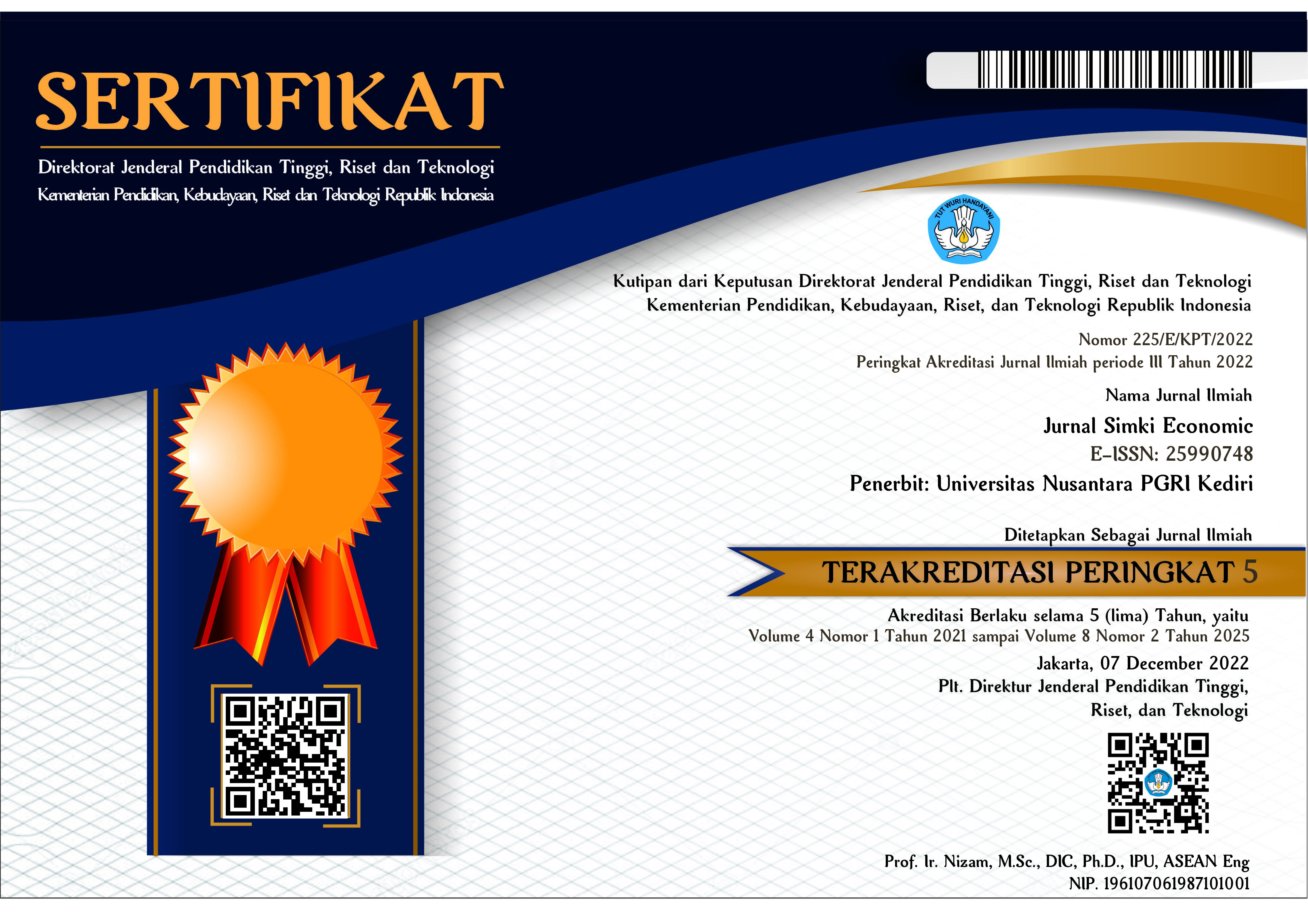Peran Electronic Commerce dalam Pemasaran Kewirausahaan untuk Mengembangkan Kinerja UMKM
 Abstract views: 605
,
Abstract views: 605
,
 PDF (Bahasa Indonesia) downloads: 351
PDF (Bahasa Indonesia) downloads: 351
Abstract
Starting from smartphones, netbooks, computers, to other devices, the internet has played an important role in shaping our new way of life. One new aspect that has emerged is online shopping, where people can now shop easily through online platforms. This phenomenon is often referred to as electronic commerce (electronic commerce or e-commerce). In business, it is important to implement e-commerce in marketing, sales and customer service activities. Many people think that marketing through the internet is more effective than traditional marketing methods because it overcomes various obstacles such as difficulty entering the market, country restrictions, and the lack of rules that apply in conventional marketing. This study is a quantitative research with a descriptive approach. Based on the research and debate that has been done, the components of overall income, business standards, the type of e-commerce media used, and the number of visitors to e-commerce media have a minimal negative effect on the growth of micro and small businesses. This conclusion is supported by the fact that the benefits derived from implementing e-commerce in the micro and small business sector are more focused on long-term benefits that are not directly related to increasing income directly.
Downloads
References
Aloysius Gunadi, B. (n.d.). Distribusi Spasial UMKM di Masa Krisis Ekonomi. Jurnal Ekonomi Rakyat.
bai, G. &. (2014). E-commerce development and its impact on regional logistics in China. Journal of Transport Geography, 21–29. http://dx.doi.org/10.1142/S1793930519000151
BPS. (2019). Klasifikasi UMKM diunduh. www.BPS.go.id
Harini, C., & Handayani, S. B. (2019). Pemasaran Kewirausahaan Melalui E-Commerce Untuk Meningkatkan Kinerja Umkm. Derivatif Jurnal Manajemen, 3(2252), 58–66. https://doi.org/10.24127/jm.v13i2.395
David, Turban Efraim king. (2012). Electronic Commerce 2012: Managerial and Social Networks Perspectives (7th Edition). prentic Hall.
et al, B. (2003). Factors Affecting Adoption of Electronic Commerce Technologies by SMEs; an Australian Study. Journal of Small Business and Enterprise Development. http://dx.doi.org/10.1108/14626000310489727
Hafni, R. dan. (n.d.). ). Analisis Usaha Mikro, Kecil dan Menengah terhadap Penyerapan Tenaga Kerja di Indonesia. Ilmu Ekonomi Dan Studi Pembangunan. https://doi.org/10.30596/ekonomikawan.v15i2.1034
Hsiao, H. L. dan R., & Ramanathan. (2012). The Impact of E-Commerce on Taiwanese SMEs : Marketing and Operations Effect. https://doi.org/10.1016/j.ijpe.2012.07.017
I. Y, N. (2009). Sektor UMKM di Indonesia: Profil, Masalah dan Strategi Pemberdayaan. Jurnal Kajian Ekonomi Dan Bisnis.
Irsad, A. (2018). Penguatan Daya Saing Usaha Mikro, Kecil dan Menengah melalui E-Commerce. Jurnal Bisnis Dan Manajemen Islam, 6 No 2. http://dx.doi.org/10.21043/bisnis.v6i2.4709
J, S. (2003). E-commerce adoption and small business in the global marketplace: A cross-cultural perspective. Journal of Electronic Commerce Research, 42–56. http://dx.doi.org/10.4018/978-1-60566-998-4
Lestari, V. D., & Suman, A. (2017). Analisis Pengaruh Electronic Commerce Terhadap Perkembangan Usaha Mikro dan Kecil. Jimfeb Undip, 1(1), 4–19. https://jimfeb.ub.ac.id/index.php/jimfeb/article/view/3718
McLoughlin, Aa. (2010). Strategic Market Management: Global Perspectives (9th ed). https://www.wiley.com/en-ie/Strategic+Market+Management:+Global+Perspectives-p-9780470689752
Nambisan. (2002). Designing virtual customer environments for new product development: Toward a theory. http://dx.doi.org/10.5465/AMR.2002.7389914
Pearson, J. . dan G. (2004). E-commerce Adoption: an empirical study of small and medium US Business. https://doi.org/10.1016/j.im.2003.12.010
Rakanita, A. M. (2019). Pemanfaatan Electronic Commerce dalam Meningkatkan Daya Saing UMKM Di Desa Karangsari Kecamatan Karangtengah Kabupaten Demak. J u r n a l E K B I S, 1280–1289. https://jurnalekonomi.unisla.ac.id/index.php/ekbis/article/view/237
Siti, M. (2013). Penerapan E- Commerce Dalam Meningkatkan Daya Saing Usaha. Jurnal Liquidity, 2. https://doi.org/10.32546/lq.v2i1.132
Sohrabpour, Mostaghel., Oghazi, ., dan P. (2022). Digitalization driven retail business model Digitalization driven retail business model innovation: Evaluation of past and avenues for future research trends. Journal of Business Research, 134–145. https://doi.org/10.1016/j.jbusres.2022.03.072
Teo, C. dan. (2006). Explaining differences in perceived usefulness of e-commerce websites across countries: A multilevel analysis. Journal of Organizational Computing and Electronic Commerce, 243–268. http://dx.doi.org/10.1016/j.im.2013.02.007
Turban, Efraimdan King, D. (2012). Electronic Commerce 2012: Managerial and Social Networks Perspectives (7th ed.). Prentic Hall.
Xie, M. Li, Y., Tan, K. C. (2002). Measuring e-commerce systems success: Applying the DeLone & McLean Information Systems Success Model. International Journal of Electronic Commerce, 31–47. http://dx.doi.org/10.1080/10864415.2004.11044317
Zhang, Zhou, D. (2007). Online shopping acceptance model: A critical survey of consumer factors in online shopping. Journal of Electronic Commerce Research, 41–62. http://www.jecr.org/sites/default/files/08_1_p04.pdf
Copyright (c) 2023 Stivaniyanti Atmanegara, I Dewa Made Yuda Mahendra, Emha Diambang Ramadhany, Dewi Masruroh, Elinda Wati

This work is licensed under a Creative Commons Attribution 4.0 International License.














